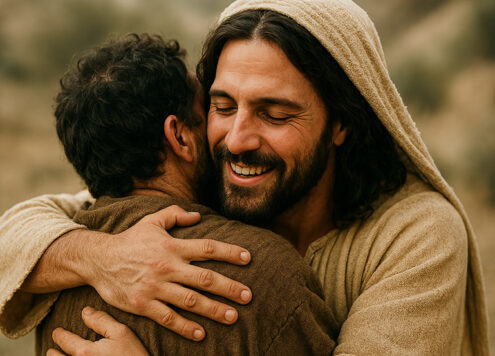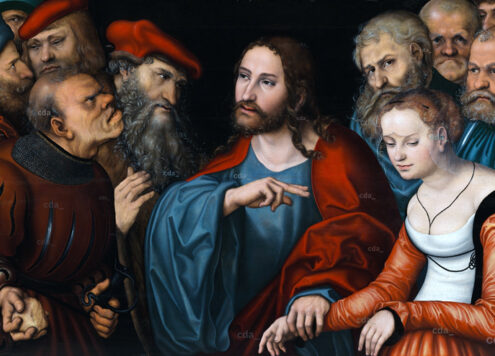—Gospel of John 20:22
Pentecost represents the outpouring of the Holy Spirit upon the early Christians.
The feast of Pentecost is celebrated fifty days after Easter, and thus is celebrated on this Sunday, May 31. It may not be celebrated, liturgically, this year and this weekend in Churches because of the Coronavirus pandemic. However, that should not prevent us from celebrating Pentecost “in Spirit and in Truth.”
Before they received the Holy Spirit, the disciples were a frightened bunch, cowering together in a room for fear of the Jewish leaders, the Romans, and the dangerous society in which they lived. But, when Jesus appeared to them and said: “Receive the Holy Spirit,” these same people became animated with a fearlessness and infectious joy to witness to Christ. They were infused with a new spirit, the Holy Spirit, that affected everything they did in thought, word, and deed.
If the Holy Spirit could turn a frightened group, like the early Christians, into dedicated witnesses of Christ, He can do it for you too.
The Holy Spirit possesses divine power to change us, transform us, and guide our lives in the way of Christ. The Holy Spirit is the third person of the Holy Trinity (hopefully, not the forgotten person of the Holy Trinity) whose purpose it is to lead us into a better knowledge and awareness of Christ. Whenever we have difficulties following Christ or behaving as Christians in our society, the Holy Spirit will always be there to show us the way if we call upon Him..
Fortunately for us, the Patristic Fathers have enumerated, from scripture, seven spiritual gifts of the Holy Spirit. St. Augustine has gone a step further than most of the early Fathers by pointing out how these seven gifts are integral to the Beatitudes of Christ ( Matthew 5 : 3-12 ) which have the power to change the human heart. Following is an account of how the seven gifts of the Holy Spirit can transform us and affect the way we conduct our lives.
- Wisdom is the first of the gifts of the Holy Spirit. This gift is a sort of felt-thought, a gift of the heart that has to do with the ability to cherish Christ’s message in good times and in bad. The gift of wisdom is not the preserve of the clever, but of those who possess the spirit of the child (Luke 18:16). Jesus assures His followers who possess this gift never to worry about what to say for the Holy Spirit will guide them (Matthew 10:19). St. Augustine sees this gift of wisdom as an expression of the seventh Beatitude, “Blessed are the peacemakers,” because wisdom flourishes when the heart is at peace.
- Understanding is the second of the gifts of the Holy Spirit. This gift enables the mind to appreciate the meaning of God’s word in scripture (John 14:26). Literally, understanding means to ‘stand under,’ to penetrate beneath appearances so as to absorb the depths of God’s word through contemplation and study. The bible is the text of God’s word, but understanding of the word is imparted through the guidance of the Holy Spirit. St. Augustine places this gift alongside the sixth Beatitude, “Blessed are the pure of heart,” because of the need to rid the heart of human falsehoods or any other obstacles to the understanding of His truth.
- Counsel is the third gift of the Holy Spirit. It is described as a type of supernatural intuition whereby one can judge rightly regarding God’s will in difficult situations. The connection is made by St. Augustine between counsel and the fifth Beatitude, ‘Blessed are the merciful,” for mercy is necessary to judge rightly, with compassion.
- Fortitude, the fourth of the spiritual gifts, imparts strength to stand up for what is right in the sight of God. It is the courage to face rejection, abuse of different kinds or physical harm for one’s beliefs. St. Augustine makes the connection between this gift and the eighth Beatitude, “Blessed are they who hunger and thirst for righteousness.” This hunger and this thirst can only be sustained by the gift of fortitude.
- Knowledge is the fifth of the gifts of the Holy Spirit. It permits one to see things from God’s perspective, not man’s, allowing one, for example, to appreciate the primacy of God’s kingdom in all that one does. Jesus refers to this gift when He asks that we “seek first His Kingdom and His approval, and everything else will be granted to you” (Matthew 6:33). St. Augustine associates this gift with the second Beatitude, “Blessed are they who mourn,” for the person who can reject worldly pursuits and trappings will have the disposition to mourn and embrace the kingdom of God.
- Piety is the sixth of the gifts of the Holy Spirit, and consists in reverence for God and all that is holy. This sense of the holy embraces God’s holy word, the sacraments, creation, and all God’s creatures. St. Augustine connects the gift of Piety with the third Beatitude, “Blessed are the meek,” for the meek possess a spirit of reverence and humility for all that is holy.
- The seventh and final gift of the Holy Spirit is what is called: Fear of the Lord. Fear of the Lord is not a slavish gift. It is a joyful gift that is akin to wonder because it brings us into communion with the grandeur of God. When the three disciples witnessed the Transfiguration of Christ on top of Mount Tabor, they were overcome with wonder and fear of the lord (Matthew 17:1–8). But it was not a servile fear; it was a joyful experience. That is why Fear of the Lord has been called the perfection of hope. St. Augustine sees this gift as an expression of the first Beatitude, “Blessed are the poor in spirit” because those who possess it are God-fearing and humble.
The Holy Spirit, as we have seen, is a very active Spirit. It goes where it wills ( John 3 : 8 ) and it wills to enter your life and change it through and through by the power of these seven spiritual gifts.
On Pentecost, the Holy Spirit descended upon the early Christians and transformed their lives in such a way that they could become a new people, an enthusiastic people with a magnificent calling.
This same divine being has the power to transform you and change you, if you are willing to let Him into your life.
Come Holy Spirit!
—Fr. Hugh Duffy











5 Comments
Emmanuel Pratt
I think you captured the meaning of Pentecost completely
Rachel
COME HOLY SPIRIT FILLS THE HEART OF YOUR FAITHFUL….
Thank you Father Duffy for this nice reflection on the Holy Spirit…we all in need of the Holy Spirit.
Have a beautiful Sunday of Pentecost,
Together in Christ and with Mary, our Mother.
Rachel & Robert – Canada
Vesna Vestments
So much meaning and riches in Christian teachings. Most of my education on Christianity and faith started with internet. Going to church regularly still did not understand much.
This article explains very well what Pentecost represents.
I regularly read Fr Duffy articles and always learn something new.
Also get remanded what is important and what is not in my daily life. Grateful for Fr Duffy!
Nancy Hill
Beautiful reflection on the 7 gifts. Thanks for the reminder and connection to the Beatitudes. Could we use the song at beginning of our liturgy? Blessings on your day 🙏🎶
Janet Patterson
Thank you for this.